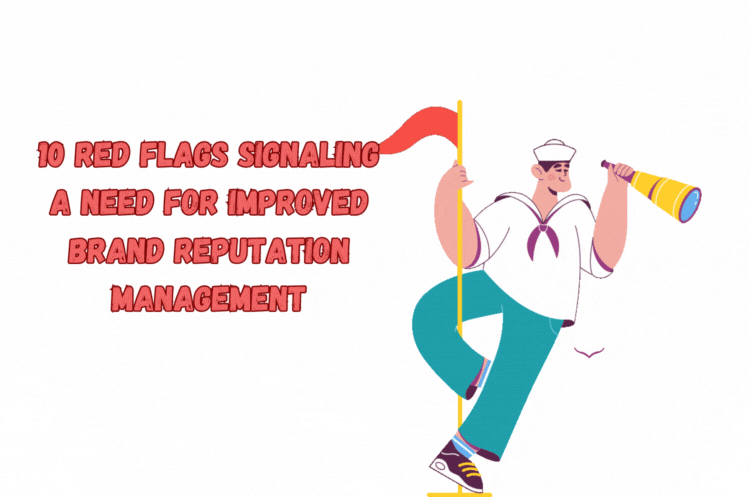Navigating the Waters of Brand Reputation Management: A Comprehensive Guide
In the fast-paced and ever-evolving world of business, where information zips across the digital realm at lightning speed, the management of a brand’s reputation is no longer just a business strategy; it’s a necessity for survival. In this in-depth guide, we’ll delve into the complexities of brand reputation management, dissect the significance of cultivating a positive brand image, and offer practical insights on recognizing and addressing signs that indicate the need for an enhanced reputation management strategy.
Understanding the Essence of Brand Reputation Management
At its core, brand reputation management involves the ongoing effort to shape and influence how the public perceives your brand. It’s a multifaceted endeavor that extends beyond traditional marketing and advertising, aiming to build trust, credibility, and positive sentiment to carve a favorable niche in the competitive market. The key lies in fostering genuine connections with your audience and stakeholders.
Why Does Brand Reputation Matter?
The importance of brand reputation cannot be overstated. It’s not just about having a snazzy logo or a catchy tagline. A positive brand reputation translates to increased brand awareness, positive customer sentiment, and, ultimately, improved sales. Studies indicate that a whopping 80% of market value is intricately linked to brand equity, underscoring the tangible impact of how consumers perceive your brand.
Measuring the Unseen: Brand Reputation in the Digital Age
In today’s digital age, where the majority of interactions occur online, gauging brand reputation requires a nuanced and multifaceted approach. Here’s a breakdown of effective strategies:
Google Alerts:
Set up alerts to receive notifications about mentions of your brand across the internet.
This proactive approach allows you to stay ahead of emerging issues and address them promptly.
Review Websites:
Regularly monitor review sites relevant to your industry.
Consider both positive and negative reviews as valuable feedback to shape your reputation management strategy.
Google Search:
Conduct periodic searches to understand what’s being said about your brand.
Analyze trends and identify potential areas for improvement or celebration.
Social Media Engagement:
Actively track your brand’s performance on social media platforms.
Engage with your audience, respond to inquiries, and address concerns promptly.
Employee Engagement:
Your employees are your brand ambassadors.
Foster a positive internal culture as it reflects externally, influencing how your brand is perceived.
10 Red Flags Signaling a Need for Improved Brand Reputation Management

Struggling to Recruit Top Talent:
Job seekers now perform thorough research on potential employers.
69% of candidates actively avoid companies with poor brand reputations.
How to Address It:
Cultivate a positive company culture.
Showcase employee testimonials and success stories.
Sales on the Decline Without Explanation:
Online reviews hold significant weight in consumer decision-making.
A minimum of 100 reviews is considered ideal for informed decision-making.
How to Address It:
Encourage satisfied customers to leave positive reviews.
Address negative reviews promptly and professionally.
Limited Brand Awareness:
Implement the “Rule of 7” – consumers need multiple interactions with your brand before making a purchase.
How to Address It:
Diversify your marketing channels.
Increase your brand’s visibility through strategic partnerships and collaborations.
Scarce Customer Referrals:
Actively manage your brand reputation to encourage customer referrals.
70% of significant purchases are influenced by recommendations from friends and family.
How to Address It:
Implement a referral program.
Showcase customer testimonials and success stories.
Competitors Flaunting Superior Reputations:
95% of Google searches stay on the first page.
A one-star improvement in ratings can lead to a 9% increase in sales.
Social media profoundly influences purchasing decisions.
How to Address It:
Invest in search engine optimization (SEO) strategies.
Leverage social media marketing to enhance brand recognition.
Drowning in Negative Customer Reviews:
Swift and professional responses to reviews can mitigate damage.
Positive brand management is an ongoing process.
How to Address It:
Establish a protocol for responding to negative reviews.
Showcase your commitment to customer satisfaction.
Minimal Social Media Engagement:
Leverage social media marketing to boost brand recognition.
Collaborate with influencers to enhance engagement and reputation.
How to Address It:
Develop a content calendar for consistent posting.
Engage with your audience through polls, Q&A sessions, and interactive content.
Caught in the Web of Negative Publicity:
Mitigate the impact of negative publicity with an effective reputation management process.
How to Address It:
Have a crisis communication plan in place.
Address issues transparently and proactively.
Preparing for a New Product Launch:
Ensure a successful product launch with a solid brand reputation management strategy.
How to Address It:
Generate anticipation through teaser campaigns.
Showcase the value and uniqueness of your new product.
Aspiring for Proven Business Growth:
Brand reputation and business growth are intertwined.
Companies with positive reputations often experience better stock performance.
How to Address It:
Invest in brand-building activities.
Align your business goals with a robust reputation management strategy.
About Build Brand Better:
Having delved into the intricacies of brand reputation management, let’s introduce a solution that goes beyond theory – Build Brand Better. In the complex realm of online reputation management, we understand the challenges of maintaining a positive digital presence, addressing negative feedback, and ensuring sustained growth.
Our team of dedicated experts specializes in tailoring solutions to elevate your brand reputation. Whether it’s navigating the delicate art of crisis communication or strategically building positive online narratives, Build Brand Better is where excellence meets reputation management. Let’s embark on a journey to not just manage but build a brand that stands the test of time. Choose Build Brand Better – because your reputation deserves nothing but the best.
FAQ
Q1: What is brand reputation management, and why is it important?
A1: Brand reputation management involves strategically shaping and controlling how your brand is perceived by the public. It is crucial because a positive reputation directly impacts consumer trust, brand loyalty, and, ultimately, business success. Approximately 80% of market value is tied to brand equity, making reputation management a vital aspect of overall business strategy.
Q2: How can I measure my brand reputation in the digital age?
A2: To measure brand reputation in the digital landscape, consider employing various tools and techniques:
Set up Google Alerts to receive notifications about brand mentions.
Regularly check review websites for customer feedback.
Conduct Google searches to understand public sentiments.
Analyze social media engagement, monitoring mentions, and interactions.
Survey employee engagement, as satisfied employees contribute positively to brand perception.
Q3: Why does low social media engagement signal a need for improved brand reputation management?
A3: Low social media engagement can indicate that your brand is not resonating with the audience. In the digital age, social media is a powerful tool for brand visibility. Increased engagement reflects a positive brand image, while low engagement may suggest a disconnect. Improving social media strategies, creating engaging content, and collaborating with influencers can enhance brand recognition and reputation.
Q4: How can negative customer reviews be effectively addressed?
A4: Responding promptly and professionally to negative customer reviews is crucial. Acknowledge the concerns expressed, offer solutions or explanations, and demonstrate a commitment to customer satisfaction. Transparent and empathetic responses can mitigate the impact of negative reviews. Additionally, actively working to accumulate positive reviews can balance the overall perception of your brand.
For more Blogs:- www.buildbrandbetter.io/blog/

